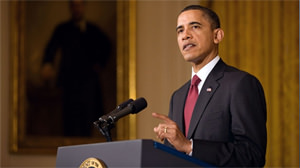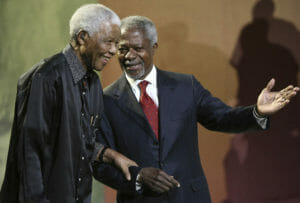Obama’s Libyan Quandary
Onward ride the old familiar horses of colonialism France and Britain have enthusiastically endorsed the UN resolution calling for a “no-fly zone” over Libya .
Onward ride the old familiar horses of colonialism. France and Britain have enthusiastically endorsed the U.N. resolution calling for a “no-fly zone” over Libya. Within hours of the vote both countries announced that their planes were at the ready. British Prime Minister David Cameron told Parliament that Britain had deployed warplanes, along with aerial refueling and surveillance aircraft. “To pass a resolution like this and they just stand back and hope someone in the region would enforce it is wrong,” Cameron said (emphasis added).
The United States, a relative newcomer to Western imperialism, seemed more hesitant, more reluctant, but nevertheless endorsed the resolution. The U.S. indicated its support for the air operations and offered the usual complement of 400 Marines offshore. Perhaps the Pentagon is eager to give new life to the Marines’ hymn and have the Marines return to “the shores of Tripoli.” Italy, the old colonial master of Libya, has been strangely silent, undoubtedly because Prime Minister Silvio Berlusconi is preoccupied with other things.
U.N. intervention has come when Libyan rebels apparently are on the verge of collapse. Libyan leader Moammar Gadhafi had threatened to invade Benghazi, “closet by closet” to find and kill the rebels. But shortly after the U.N. vote the Libyan foreign minister declared “an immediate cease-fire” in “all military operations” against the rebels — an announcement which Prime Minister Cameron scornfully dismissed. Why are these Western nations so determined to impose their hand and footprints on Libya? Could the prize be the all-too-familiar one of oil?
The Libyan rebellion, part of a general Arab uprising against despotic regimes, naturally should be welcomed, particularly by the United States and its “democratic, anti-colonial” tradition. But Gadhafi’s regime has enormous power and resources to quash the disparate, poorly armed rebels, and it is unlikely that a no-fly resolution will succeed in stopping him from brutalizing his own people.
The heavy patrolling and bombing over Bosnia and Serbia in the 1990s did nothing to prevent the massacre at Srebenica and other places. Even more significant, and strangely absent from commentary now, is the destruction the U.S. and its allies visited upon Iraq, also in the 1990s, in a futile attempt to bring down Saddam Hussein. What we destroyed instead was much of the professional and middle classes in Iraq. That nation’s medical delivery system, arguably the best in the Arab region, was destroyed and denied to the Iraqi people by coalition attack. The military tactics combined with heavily enforced sanctions shattered the Iraqi infrastructure and economy, and the invasion in 2003 only visited further disaster on what was a shell of a nation.
Recent events raised the possibility of an alternative, although probably not to the liking of David Cameron. On March 14, the Arab League called for imposing a no-fly zone over Libya. What welcome, but largely overlooked, news. Remembering the political adage “watch their feet, not their mouths,” we know there is no substance to the Arab League position. What the Arabs really were asking is that the United States, now the world’s foremost mercenary, do something about their despised Arab colleague, and perhaps incidentally aid the Libyan rebels.
The Arab League behaved as a mouthpiece for the seemingly discredited Paul Wolfowitz and his band of merry neocons (the Arab League and Wolfowitz — there is irony for you!), now anxious to wade into Libya with guns blazing and with what available troops, ordinance and airplanes can be mustered. For them, the march for empire is inevitable, inexorable and withal indubitably beneficial to us and the world. Wolfowitz defies F. Scott Fitzgerald’s dictum, as unfortunately there are bad second acts in American life. Until the passage of the U.N. resolution, President Barack Obama seemingly ignored and deflected the war chants and gratuitous advice of the Wolfowitz crowd. Perhaps Obama recognizes the limits not only for our capacity for war, but for mobilizing the energy and will to conduct — and finish — one.
The Arab League’s call for a no-fly zone has not been accompanied by a clear commitment that its members would participate beyond offering Arab cover and little more than sympathy and succor. Pity. The 22-member league could readily assemble a force vastly superior to Libya’s. Many of the members — notably Egypt, Saudi Arabia and Jordan — have received lavish military aid from the United States for decades, including highly sophisticated aircraft.
The bold campaigner of the 2008 presidential race missed a wonderful opportunity for the audacious spirit he displayed then. Imagine if Obama had seized upon the news from the Arab League’s Cairo headquarters and urged our Arab “allies” to themselves impose a no-fly zone over Libya. “Yes you can,” the president might have said. We already have provided the Arabs with planes; presumably, the Saudis would be able to spare fuel. Let the Arabs themselves establish restraints and limitations on Gadhafi. We need not further impair our credibility in that part of the world. This time let us be the one to offer sympathy and succor, and let others do the heavy lifting.
More than 60 years ago United States committed itself to the doctrine of collective security. The ratification of the 1949 NATO treaty incorporated the idea as part of our fundamental law. But collective security has been a snare and chimera, with the United States bearing the effort and costs, with only token contributions from allied nations. (See Afghanistan.) Collective security all too often has been a ploy to mobilize public opinion in support of a dubious war. (See Iraq.)
George Washington Plunkitt, the longtime Tammany Hall chieftain and the prototype of the early 20th century machine politician, carefully navigated the shoals of “honest graft.” He had no difficulty in defending his actions, and nicely summed up his operating philosophy: “I seen my opportunities and I took ’em.” President Obama, with his familiar passivity, along with his perplexed foreign-policy and defense advisers, apparently is determined to let opportunity elude his grasp.
The president has been mired in a quandary over Libya. He seems to know better than to bog us down in another military adventure, yet his fundamental decency and regard for some measure of human rights in all probability propelled a desire on his part to do something for the Libyan rebels. But he missed a splendid opportunity to call the Arab League on its own pronouncement. Had he done so, he might well have imposed a new dimension to the concept of collective security — one that might have restored and fulfilled our original hopes.
Stanley Kutler is the author of “The Wars of Watergate” and other writings.
Your support matters…Independent journalism is under threat and overshadowed by heavily funded mainstream media.
You can help level the playing field. Become a member.
Your tax-deductible contribution keeps us digging beneath the headlines to give you thought-provoking, investigative reporting and analysis that unearths what's really happening- without compromise.
Give today to support our courageous, independent journalists.





You need to be a supporter to comment.
There are currently no responses to this article.
Be the first to respond.